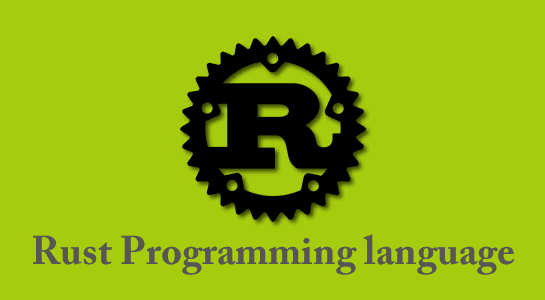

As a systems programming language, Rust is surprisingly safe, much like JavaScript or Python. According to IBM, Rust gives you the speed and low-level benefits of a systems language without the pesky garbage collection of languages like C# and Java. Besides, it is memory efficient and much more powerful compared to C/C++.
Rust has proved to be a great programming language in aspects that other languages are not as good. For instance, writing low-level code such as device drivers and operating systems. It also embeds and integrates well with other programming languages.
With Rust, you can write faster yet more reliable software. Different groups of people find the programming language useful for various reasons. Students can learn about system concepts like operating systems development. Likewise, companies can use Rust in web services, bioinformatics, and many more tasks.
Before looking at top books to learn Rust, let us first understand what Rust is.
What is Rust?
It is a high-performance and static compiled general-purpose programming language with multiple paradigms. Forbes indicates that Rust, a relative newcomer in the systems programming world, boasts many functional features. Rust primarily focuses on safety and performance and can power vital performance services. The language is critical in building robust, reliable, and efficient software that is secure.
The relatively new programming language seeks to address such issues as memory errors and the development of concurrent programs. Such problems are characteristic of C/C++. Rust has effectively solved the issues and works exceptionally well. That explains why it is used among organizations like Firefox, Dropbox, and others.
Below are the top five books that offer the best way to learn rust programming language.
Top 5 Books to Learn Rust

Are you searching for the most effective way to learn the rust programming language? Here is a list of five Rust books for you.
Programming Rust: Fast, Safe Systems
Development
With Rust systems programming language, you can write faster, more dependable software. The book shows the focus that Rust puts on memory. Even as a novice in programming, you can learn how to write simple functions in Rust. Besides, you will acquire knowledge on data types, multithreading, lifetime, and more.
Additionally, you will learn to use an inbuilt Rust package manager, Cargo. Thus, when you create your code, you can also test it safely and successfully.
In most programming languages, high-level ergonomics and low-level control are frequently at cross purposes. However, Rust enables you to control low-level details like memory usage and high-level ergonomics. Thus, Rust effectively removes the hassle usually linked to low-level languages.
The book chapters highlight advanced features, appendixes on development tools, and the standard rust library. Among its advanced features are macros and Rust editions. Hence, in Programming Rust, you have one of the most effective rust books to help you how to learn Rust.
Rust in Action
It might be the rust programming language we want to take, but you need to figure out where to start. That should not worry you anymore. Rust in Action is a great book to kick off learning Rust programming. It outlines the basics of Rust language, its syntax, and its effective use.
In addition, advanced topics like building network applications and working with multithreading are also covered. The hands-on book makes systems programming with Rust easier for programmers. Rust in Action is ideal when exploring networking and kernel-level programming in Rust.
With Rust in Action, you will learn the essentials of Rust programming language. The book explains how you can use Rust in practical situations. It also allows you to discover Rust applications for file manipulation besides techniques for parallelism and concurrency.
Beginning Rust: From Novice to Professional
You can easily learn to program with Rust as a beginner or with some programming know-how. The book lets you learn Rust’s basics, like naming objects and controlling execution flow. Other things you can learn from the book include:
- Memory allocation
- Performing arithmetic
- Handling of input and output
Mastery of these core skills means you are ready to start working on handling errors. Eventually, you will be able to create vigorous Rust applications with object-focused features of Rust. The book provides a user-friendly language to kick-start your coding career.
Hands-on Microservices with Rust
A hands-on book is instrumental in imparting game development skills to a programmer. The book chapters have rich real-world projects in the game development sphere. You will learn high-performance microservices appropriate for computing and caching tasks.
The books will take you into both reactive programming and asynchronous programming. It will enable you to debug your microservices and deploy them into cloud platforms. Ultimately, you will be able to use Rust macros when describing the business entities of the application.
The Complete Rust Programming Reference Guide
The book is meant for programmers transitioning from beginners to intermediate levels. At this point, it is expected you have learned advanced Rust constructs. So, the book will help you to design, develop and deploy operative software systems.
You will learn the Rust features through the book due to straightforward explanations and examples. You will learn basics like data types, control flow, functions, and variables. Subsequently, you will learn advanced concepts, including closures, iterators, maps, and strings.
Understanding concurrency through pips (Rust’s lightweight threads) is next in line. Then follows the turn to learn about object-oriented programming in Rust. Lastly, macros will ensure your Rust programming language is wide-ranging to fit your needs.
You can write programs that meet Rust’s objectives at the end of the rust programming language tutorial. That is a safe, concurrent, and fast program. The development of Rust web frameworks makes the programming language appropriate for large-scale projects.
Concluding Remarks
You may choose the Rust programming language over the others as a programmer. Rust is safe, fast, and robust; with it, you can write bug-free high-performance code. Not forgetting Rust’s great memory management and ease of integration. All these make Rust a programming language of the future.